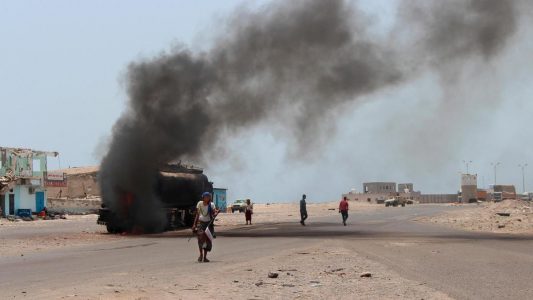
Resurgence of terror groups in Yemen is a cause for concern
At a time when the main thrust of diplomatic activity in Yemen is focused on ending the country’s bitter civil war, the recent spate of attacks against the Yemeni security forces demonstrates the continued threat posed by terror groups such as Al Qaeda and ISIS.
In the latest attack, three members of Yemen’s security forces were killed in the southern port city of Aden on Friday following a suicide bombing.
And in a separate attack, a senior security official survived a roadside bomb attack against his convoy in central Aden. Five of his guards were injured in the incident.
Initially Yemeni officials blamed the attacks on Al Qaeda, which has been responsible for an upsurge in terrorist activity in southern Yemen in recent months. But this claim was undermined when ISIS, which regards itself as a more extreme Islamist terror group than Al Qaeda, claimed responsibility.
The fact that both of these terrorist organisations now appear to be operating freely in areas of southern Yemen that are supposed to be under the control of government forces is a deeply worrying development, one that does not bode well for international diplomatic efforts to resolve the country’s long-running war.
The resurgence of such terror groups is certainly causing deep concern for Saudi Arabia and the UAE, which are playing a lead role in efforts by Saudi-led coalition forces to protect the country’s UN-backed government from attack by Iranian-backed Houthi rebels.
Shortly before the latest terror attacks took place, UAE warplanes carried out precision air attacks against terror cells that had infiltrated positions in southern Yemen. A statement issued by the Ministry of Foreign Affairs and International Co-operation said the military operation had been carried out “in accordance with the coalition’s rules of engagement and applicable principles of international humanitarian law, including the Geneva conventions”.
Prior to the coalition’s military intervention, Islamist groups like Al Qaeda regularly carried out bombings and assassinations in Aden during the period that it was initially liberated from Houthi rebels in 2015. The ability of Al Qaeda and ISIS to resume their terrorist activities in the area is being blamed on a damaging rift that has developed between forces allied to the government and those affiliated with the Southern Transitional Council (STC). The most recent attacks were carried out against targets affiliated with the STC.
The schism between the formerly allied factions, which is being dubbed a “civil war within a civil war”, has prompted Saudi Arabia and the UAE to call for both sides to take part in reconciliation talks in Jeddah.
At a time when the main focus of coalition forces is to defeat Houthi rebels, the last thing they need is for damaging splits to emerge among factions that share an opposition to the militia. The aim of the proposed Jeddah summit is to persuade both sides to settle their differences and resume their military alliance against the Houthis, rather than fighting each other.
But while the STC has said it is willing to participate in the talks, government-affiliated forces are still refusing to take part and have continued fighting against their former allies – all of which is a gift for terror groups such as Al Qaeda and ISIS, which thrive on exploiting situations where government forces have lost control.
After their recent setbacks in countries such as Iraq, Syria and Afghanistan, Islamist groups are keen to establish new bases from which to plot a fresh wave of terror attacks against the West and its Arab allies.
Yemen, where the government has struggled to exercise its authority throughout the country for decades, has been a favourite haunt of Al Qaeda militants, who set up a new franchise, Al Qaeda in the Arabian Peninsula (AQAP) after Osama bin Laden’s organisation was driven out of Afghanistan by the US-led coalition in 2001.
Indeed, AQAP has been responsible for some of Al Qaeda’s more audacious attacks, including the cargo bombs plot, in which terrorists attempted to smuggle bombs hidden in computer printers on an American aircraft flying to the US on Christmas Day 2009. The attack was only thwarted following a tip-off by UAE intelligence officials. In 2000 Al Qaeda targeted the USS Cole, a US Navy guided missile destroyer that was refuelling in Aden harbour. Its operatives attached an explosive-laden small boat to the hull and killed 17 American sailors in the deadliest attack on a US naval vessel in more than a decade.
Al Qaeda’s presence in Yemen continues to be a top priority for US counterterrorism officials, who regularly mount military attacks against AQAP targets from the US military base in Djibouti.
Moreover, Al Qaeda’s determination to hold onto its base in Yemen has deepened in recent years as it has come under pressure from ISIS, which regards itself as a more ruthless organisation, particularly when it comes to launching attacks against fellow Muslims.
The deteriorating security situation in Yemen, together with the revival of Islamist terror groups, will certainly make it harder for attempts by UN negotiators to resolve the wider conflict between the Yemeni government and Houthi rebels.
The truce negotiated following UN-sponsored talks in Sweden eight months ago over the vital port city of Hodeidah has still to be fully implemented. Swedish Foreign Minister Margot Wallstrom, who arrived in Jordan on Sunday and will be visiting the UAE, Saudi Arabia and Oman in a bid to revive talks between the Yemeni government and the Houthis, has described the peace deal reached in Stockholm as “fragile”.
It is certainly true that any attempt to end Yemen’s long-running conflict is unlikely to succeed so long as terrorist organisations such as Al Qaeda and ISIS are able to continue their operations in the country with impunity.
Source: The National





